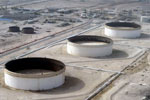 Reuters: U.S. President Barack Obama is likely to determine by Friday that there will be enough oil in the world market to allow countries to cut imports from Iran, taking another step toward sanctioning those nations that do not, analysts and a congressional aide said.
Reuters: U.S. President Barack Obama is likely to determine by Friday that there will be enough oil in the world market to allow countries to cut imports from Iran, taking another step toward sanctioning those nations that do not, analysts and a congressional aide said.
By Timothy Gardner and Arshad Mohammed
 WASHINGTON, March 29 (Reuters) – U.S. President Barack Obama is likely to determine by Friday that there will be enough oil in the world market to allow countries to cut imports from Iran, taking another step toward sanctioning those nations that do not, analysts and a congressional aide said.
WASHINGTON, March 29 (Reuters) – U.S. President Barack Obama is likely to determine by Friday that there will be enough oil in the world market to allow countries to cut imports from Iran, taking another step toward sanctioning those nations that do not, analysts and a congressional aide said.
Obama is required by a sanctions law he signed in December to determine by March 30, and every six months after, whether the price and supply of non-Iranian oil are sufficient to allow consumers to “significantly” cut their purchases from Iran.
“Every indication we have received… gives us every assurance that the president will make the determination that sanctions can proceed,” said a congressional aide who spoke on condition of anonymity, saying the indications had come from both the State Department and the Energy Department.
The law allows Obama after June 28 to sanction foreign banks that carry out oil-related transactions with Iran’s central bank and effectively cut them off from the U.S. financial system.
The sanctions aim to pressure Iran to curb its nuclear program, which the West suspects is a cover to develop atomic weapons but which Iran says is purely civilian.
The U.S. sanctions, an upcoming European Union embargo on Iranian oil exports and speculation about an Israeli attack on Iran’s nuclear facilities have helped drive up oil and gasoline prices, a political problem for Obama ahead of the Nov. 6 election.
But the administration is also mulling a coordinated tap of emergency oil reserves with Britain and other countries that could tamp down gasoline prices.
Under the law, Obama can only impose sanctions if he first determines the price and supply of non-Iranian oil is sufficient for countries to significantly cut their dependence on Iranian crude. Last week Washington exempted Japan and 10 EU countries from the sanctions because they have cut Iranian oil purchases.
U.S. officials praised Japan’s reductions by an estimated 15 to 22 percent in the second half of 2011, noting it did so after an earthquake that forced it to shut down nuclear power plants and to boost its use of petroleum fuels to generate electricity.
“Right now there are enough barrels,” said Jamie Webster, a manager at Petroleum Finance Corp in Washington. “There is some ability, as Japan has shown, to find alternative barrels to Iran.”
A Feb. 29 report by the Energy Information Administration that was required by the sanctions law said there were several interruptions in global oil output, prices were nominally high and spare capacity was limited. But it also indicated global inventories were high.
“This would justify expecting substantial compliance from our allies and allowing waivers only for those countries that have made significant efforts,” to cut purchases from Iran, said David Goldwyn, who headed international energy affairs at the State Department until early 2011.
Another Washington based oil analyst, who did not want to be named, said Obama may well indicate the market is sufficient, but remains tight as described in the EIA report, to sustain a case for eventual tapping of domestic emergency reserves. “So it could be a ‘yes-but’ type of finding,” he said.
The supply picture could change later this year as the lone major oil supplier with spare capacity, Saudi Arabia, has already boosted production to the highest level in decades and analysts expect the sanctions could cut 800,000 barrels a day of Iranian exports by late this summer. (Editing by Russell Blinch and Bob Burgdorfer)


